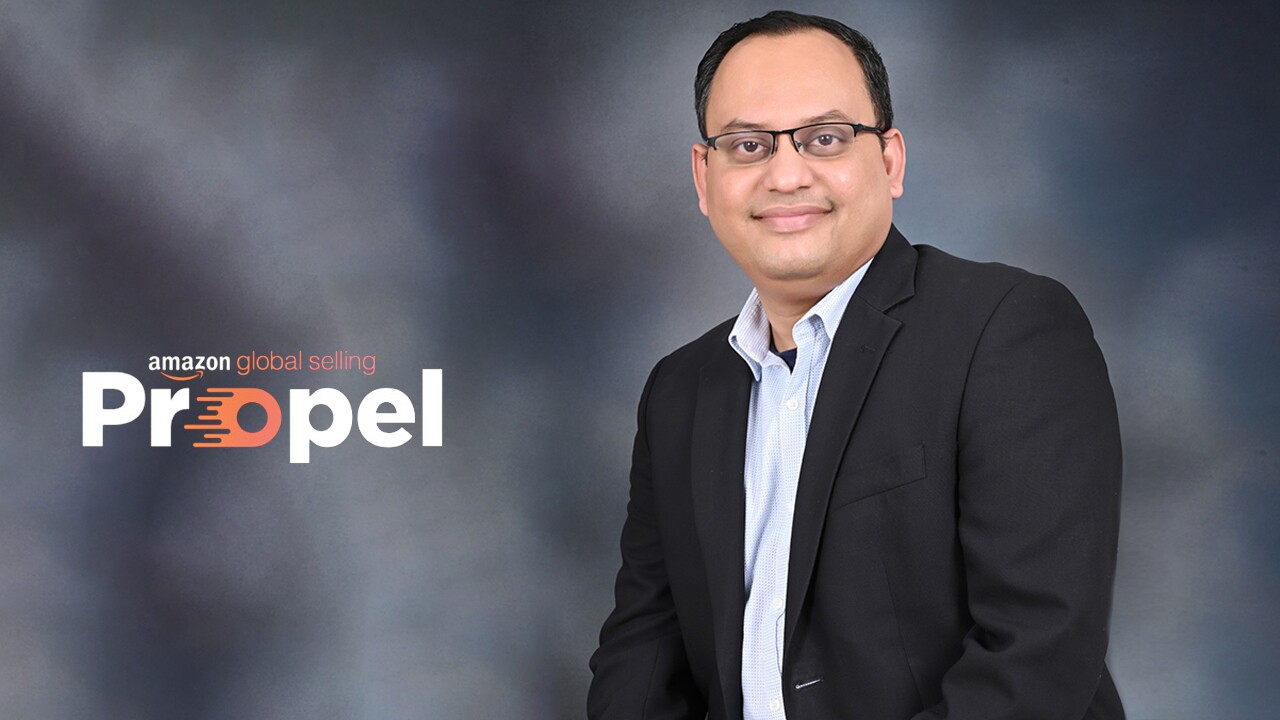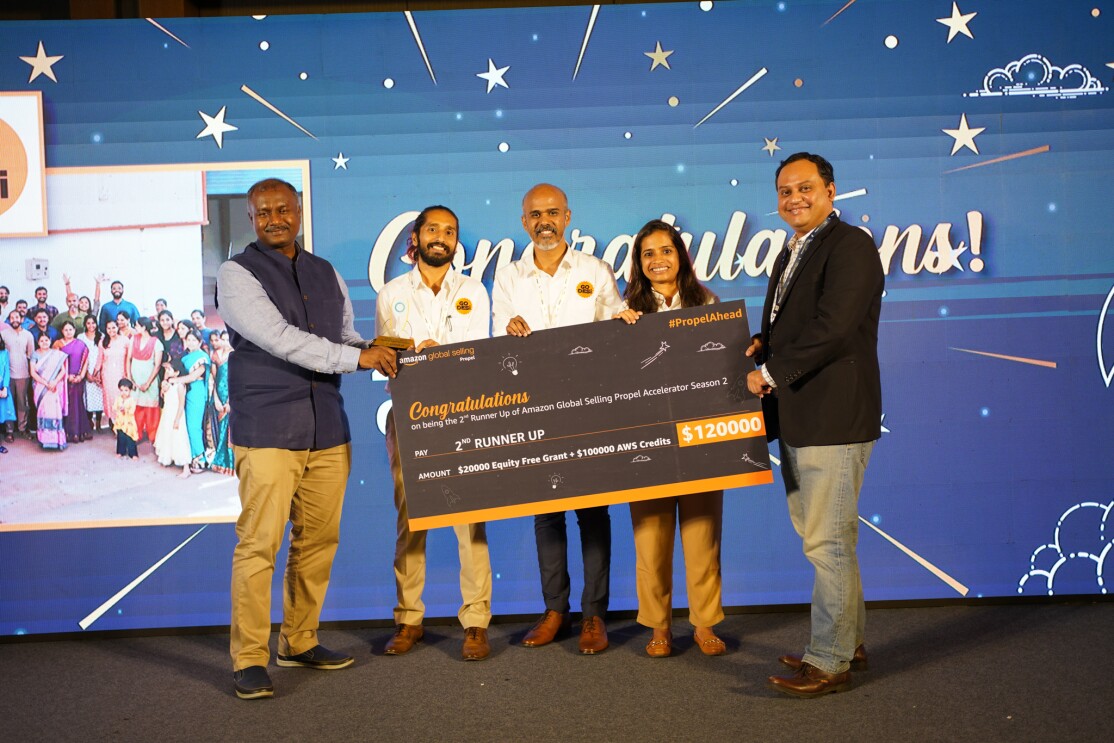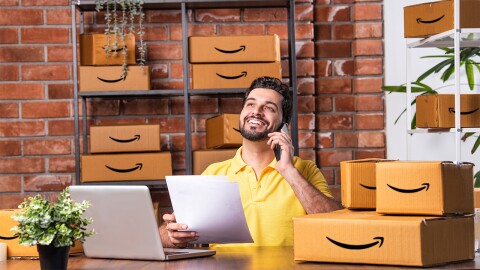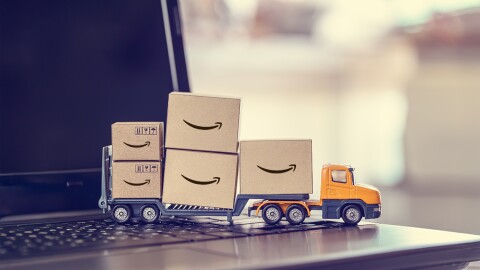
Amazon India has announced the third season of Amazon Global Selling Propel Startup Accelerator, a program that supports emerging startups who want to sell globally. Season 3 of Propel will help up to 50 D2C startups to launch in international markets and create global brands from India. Applications open today and close on April 30.
The program offers a combined $100,000 in equity free grants to the top 3 winners. It also offers participants the opportunity of winning rewards worth over $1.5 million, including AWS Activate credits and ads credits, besides logistics and account management support for one year.
It’s still Day One for Indian D2C brands with global ambitions, says Bhupen Wakankar, director of Global Trade. Wakankar is a tenured Amazonian who has been with the company since 2015. In his present krole, the IIT Bombay and Wharton School alumnus heads Amazon India’s Global Trade, which includes the Amazon Global Selling program where over 100,000 Indian sellers ship products to more than 200 countries and territories across the world.
In a freewheeling interview, Wakankar discusses Season 3 of the Propel Startup Accelerator, the potential for e-commerce exports from India, and scaling opportunities for D2C startups during a funding winter.

The Propel Startup Accelerator is now in its third year. How has the program evolved over the last few years and what changes can be seen in S3?
Season 3 has been designed to make a bigger impact on the D2C ecosystem in India and provide comprehensive support to early-stage startups. I see cautious exuberance and growing maturity in the ecosystem, which comprises four main pillars: firstly, there are the D2C brands powered by entrepreneurs. Second, we have the venture capital and angel investing community that funds these ventures and helps them grow. Then there are enablers from a tech, payments, and delivery standpoint—companies like Amazon and others. The fourth pillar: government and regulatory bodies that are creating policies for growth. For Season 2, we got over 1,000 applications from over 100 cities in India, with 15 finalists eventually being selected. However, we felt a lot more could be done to increase reach and influence of early-stage startups in a more structured manner. Hence, in typical Amazon style we are going 3x this year with 50 finalists. Also, we are partnering with six VC partners (Smbhav Venture Fund, Sequoia Capital India, Fireside Ventures, DSG, Accel, and V3 Ventures).
Another first this year: Amazon is offering participating startups access to revenue-based financing firms such as Klub and Velocity, who will provide curated offers to help scale their business. This year we also have rewards worth over $1.5 million, including AWS Activate credits, ad credits, and logistics and account management support for one year.
How is Amazon reducing entry barriers to global selling through Propel and related initiatives?

Amazon is simplifying global selling for Indian startups by providing a low-friction platform to reach customers around the world. Brand managers can easily experiment with new product offerings by sending say 100 units of three different products and get started with us. Our aim is to democratise exports for players of all sizes. Amazon is committed to removing friction from the selling process for even the smallest of players, allowing them to innovate and disrupt categories across the board. This approach empowers Indian startups to reach a global audience and drive growth through e-commerce. We are just getting started on the D2C front.
Most D2C brands presently are India-focused while some are exploring global selling for the first time. What do you make of the trajectory for e-commerce exports from India, and can their growth mimic that of Indian IT companies that became global brands through software exports?
In my opinion, D2C brands can take a path similar to that of SaaS players who grew by selling software to overseas customers. It's clear that brands are willing to experiment, as the cost of experimentation has been reduced significantly. Amazon's infrastructure has made scaling a non-issue. Logistics products such as ‘SEND’ (a one-stop cross-border logistics solution that functions like a marketplace) have been well-received, particularly by smaller players who lack negotiation power.
The spirit of Propel is to start early, and we encourage D2C brands to consider exports from the outset, rather than as an afterthought. Awareness building and education are the key here. The Indian market for D2C brands was valued at $33 billion in 2022, while the global market is 5-10 times larger. So, the global playground is much bigger and scale is available.
We are in the midst of a global funding winter and macro-economic realities are hitting the startup ecosystem. Does that concern you?

We have designed Propel to help early stage startups take the right steps in their journey to go global. The program offers a variety of benefits to participants including equity-free grants from Amazon and AWS credits, besides advertising credits, logistics, and account management support. And then of course they have a chance to pitch their ideas to some of the leading VCs in the country. So, a shot at VC funding is important, but not the only thing that Propel offers. Moreover, the fact that six leading VC firms in this country are partners in this program underlines the excitement about the program among the VC community. What we have also done in this season is brought in two new revenue-based funding partners for helping startups with short term loans or working capital access at better-than-market rates. All these are critical enablers for startups to take their first step in their global journey. We feel very confident about the program’s prospects and it is a key needle mover towards achieving our pledge of enabling $20B in cumulative exports from India by 2025.
Is there enough differentiation and specialisation among new D2C brands to keep customers engaged?
Absolutely. Remember, Amazon caters to a potential market of 2 billion e-commerce shoppers and over 200 million Prime members worldwide. There is ample room for multiple brands to exist and thrive. As customer needs and demographics evolve, there is growing demand for unique and specialised products, providing opportunities for new D2C brands to differentiate themselves and capture a loyal customer base. Presently, there are just about 2,000 D2C brands in India, which is inadequate considering the country's manufacturing capabilities. According to various market research reports, we can expect around 10,000-12,000 new brands to emerge and these brands will require a lot of infrastructure support as they shore up. Therefore, the ecosystem needs to continue investing in the growth of D2C brands. We are at a crucial inflection point, and we hope to see significant progress each year.
The government is expected to announce India’s new Foreign Trade Policy (FTP) later this month. What changes would you like to see so that e-commerce exports get a fillip?
E-commerce exports is the simplest way for any business to export their product and get access to international buyers. An enabling FTP would boost e-commerce exports through simplified compliance and customs-related processes and conducive packaging guidelines. It would help bring Indian e-commerce exports at par with global best practices. Success of exporters on e-commerce channels is determined by three factors—selection of products available, price of product, and speed of fulfilment. The clearances needed to be obtained by exporters creates compliance costs for MSMEs and eats into their valuable resources, including the time taken for fulfilment. To enable faster clearance of time-sensitive e-commerce export shipments, dedicated customs clearance lanes should be created, with end-to-end digitisation and 24x7 service. This will enable Indian exporters to meet the customer satisfaction levels enjoyed by exporters in other jurisdictions. For smaller sellers to adopt e-commerce exports, the FTP should also include exemptions for re-import of unsold/returned goods. Return is a common feature of ecommerce. Unsold inventory that can no longer be stored in warehouses or inventory that was shipped from India but is now being returned due to some issue should be exempt from paying import duties. The FTP should consider these instances as ‘reimport without completion of sale’. For this purpose, documents required at the time of exporting should suffice to avail the exemption. There are also issues around reconciliation of payments, which needs to be addressed.











